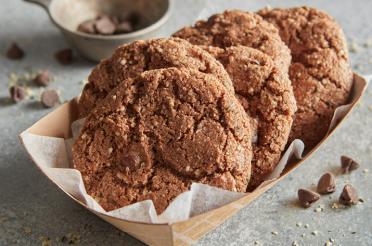Choosing Oil
Move over, Rachel - there's more to oils than EVOO. Join Hilah Johnson as she reviews the different types of oils available and which ones are best for particular uses, like baking, frying and salad dressings.
Find more Co+op Kitchen videos featuring information and easy recipes for making delicious meals at home, as well as handy hints from chefs and food enthusiasts who love sharing their passion for great food.
Video Transcript
Hey. I'm Hilah, and today we're going to talk about oils and everything that you need to know in order to pick the right oil for your cooking purpose.
Higher quality oils are going to be your cold-pressed oil, so it's not getting overheated as it's getting expelled. They retain a lot more of the nutrients from the plant that they came from, and they're also a lot more flavorful. I've got several here.
Types of oil
Olive oil
We'll start with these olive oils. The extra virgin olive oil is made from the first pressing of the fruit. It's going to have a lot more fragrance, a lot more flavor to it. And this second pressing gives you the virgin olive oil.
And then the light olive oil is a refined olive oil, so it's actually been filtered out to get all the proteins and everything out of it. It's a good choice for high-heat cooking as opposed to the extra virgin olive oil, which is probably going to burn if you tried to use it to saute something.
Corn oil
Over here on the end I've got some corn oil, and this has been refined. Corn oil, you can see, has a nice golden color. It's a very neutral-flavored oil. It's a good choice for cooking with if you don't want the flavor of the oil to come through.
Vegetable oil
Second, we've got vegetable oil. Now vegetable oil is just a blend of oils. Often, it's soybean or corn, some mix thereof. Sometimes it's just one or the other. But it's also good for high-heat frying. If you have to do like some deep frying, you might want to use vegetable oil, because it's really inexpensive.
Safflower oil
Here we've got some safflower oil. I really like safflower oil for salad dressings, but you can also use it for cooking. It's also very high-heat stable, so it's a fine choice for that. So it's a good all-purpose oil.
Canola oil
And then I've got canola oil. It's got a lot of good fats in it that are good for your heart, but it's also high-heat stable, so you can use it for cooking.
Peanut and sesame oil
And then these two here, these are both unrefined. This is an unrefined peanut and an unrefined toasted sesame.
Peanut oil is naturally high-heat stable, so you can use it for stir-frying, and it might add a nice little nutty flavor.
Same thing with the toasted sesame oil; you can use that for medium to medium-high heat, and it adds a great nutty, sesame flavor. You could use it in any kind of like Asian stir-fry dishes.
Walnut oil
Here we've got some walnut oil. And walnut oil has a really great walnut fragrance, aroma. It makes it really nice to use in a salad. You can top that salad then with some toasted walnuts.
Grapeseed oil
And this is some grapeseed oil. And this is beautiful. This color is absolutely amazing. Because it is just naturally very high-heat stable. In its color, you could see like that would be so fun to make a salad dressing out of.
Sunflower oil
And then here we've got some sunflower oil. Like safflower oil, sunflower oil is a good choice for salad dressings or cooking with. It's got a lot of good oils in it that are good for your heart, but it's also stable at high temperatures.
Coconut oil
And then finally, I've got some coconut oil here. Coconut oil is vastly different from all these. As you can see, it's actually a solid at room temperature. It's good for baking—if you wanted to use it as a vegan alternative in a pie crust or muffins or anything like that.
I like to use coconut oil to make popcorn with, and it gives a really nice flavor and then put a little chili on there, and it's pretty awesome you guys.
Storing oil
All oils can go rancid, although unrefined oils are going to be a lot more prone to go rancid faster.
It's best to store it in the fridge if you're not going to use it very often. And it might turn a little bit cloudy on you, but that's fine. You can still use it. And it'll just help it stay good a little bit longer.
I'm Hilah for Co+op, stronger together.













